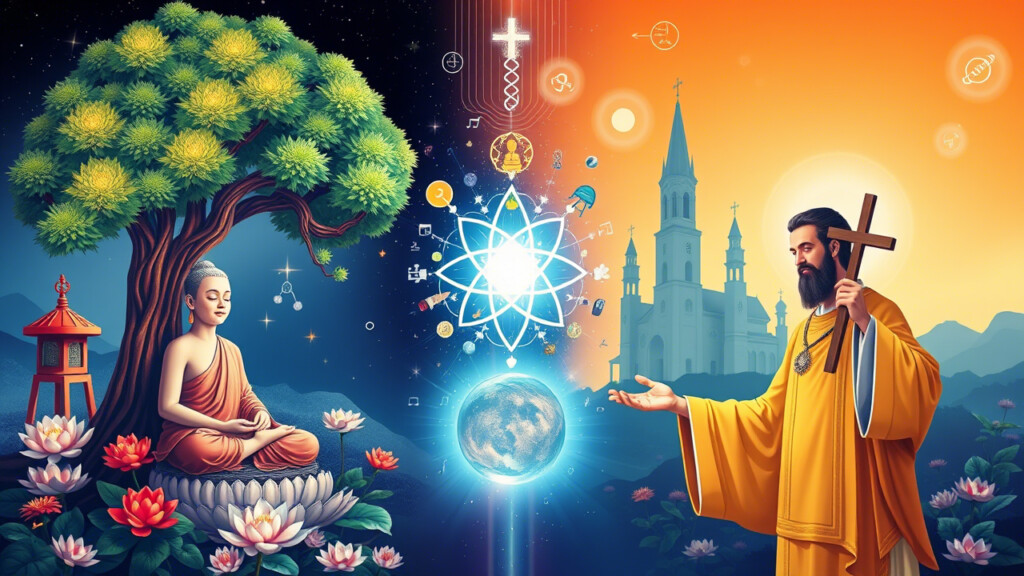Religion and science are often seen as opposing fields, but in reality, they share important intersections. Christianity and Buddhism—two of the world’s major religions—have had a significant influence on philosophy, psychology, ethics, and our understanding of the universe. But when it comes to compatibility with science, which religion aligns more closely with its principles?

What is Science?
Science is a system of knowledge built on observation, experimentation, and verification. It requires clear evidence that can be measured and repeated under the same conditions. Personally, I always find it fascinating when a scientific hypothesis is successfully tested because it demonstrates that the world operates according to discoverable and understandable laws. If a theory cannot be tested or repeated under similar conditions, it is not considered scientific.
However, both Christianity and Buddhism are based on belief systems—whether it’s faith in a supreme being or trust in the natural laws governing the universe. The question is: which religion has a belief system that is closer to the way science operates?
1. Christianity: Faith in a Creator
The World Created by God
Christianity is founded on the belief that the universe was created by an omnipotent being—God. According to the Bible:
“In the beginning, God created the heavens and the earth.” (Genesis 1:1)
“For in Him all things were created: things in heaven and on earth, visible and invisible.” (Colossians 1:16)
Thus, Christianity views the universe as a masterpiece designed by a supreme intelligence, and human beings as possessing an immortal soul, created in the image of God.
Christianity and Great Scientists
Despite belief in God, many great scientists in history have made significant contributions to science:
- Georges Lemaître (1894-1966) – A Catholic priest who proposed the Big Bang Theory, the scientific model of the universe’s origin.
- Isaac Newton (1643-1727) – A great physicist who laid the foundation for classical mechanics and the law of universal gravitation, and was also a devout Christian.
- Gregor Mendel (1822-1884) – A Catholic monk, known as the father of genetics.
- Michael Faraday (1791-1867) – A famous physicist known for electromagnetic induction, and a devoted Christian.
- Francis Collins (1950 – present) – The leader of the Human Genome Project, a Christian who supports evolution.
Although many scientists have been Christians, some conservative branches of Christianity still conflict with science, particularly in beliefs about miracles and rejection of evolution. However, some denominations (such as Catholicism) have adjusted their perspectives, accepting evolution and the Big Bang Theory as part of God’s plan.
For example, in real life, some people thank God after being saved from illness instead of acknowledging doctors. I have witnessed a friend go through this. After a successful surgery, instead of thanking the doctor, she believed that God had saved her. This made me think: does religious belief sometimes make people overlook the role of science and medical professionals?
Similarly, when firefighters rescue people from danger, those who are saved often thank God rather than the firefighters who risked their lives. This reflects a strong belief that God can intervene in life, including healing illnesses. Many other Christians believe that God works through doctors and medical science, seeing them as His instruments to help humanity.
Some branches of Christianity, particularly Catholicism, have rules regarding interfaith marriage (a Catholic marrying a non-Christian). According to Canon Law (Canons 1124-1129), a marriage between a Catholic and a non-Christian requires approval from the Church, and the non-Christian spouse must agree not to hinder their partner’s faith. If approval is not granted, the marriage may not be recognized within the Church.
Christianity is Not a Unified System of Beliefs Regarding Science. While some conservative Christian groups reject evolution and rely heavily on supernatural miracles, many others—especially Catholicism and some moderate Protestant groups—accept evolution and scientific discoveries as part of God’s plan. Pope John Paul II once stated that evolution is “not contrary to faith” if understood correctly. Additionally, many Christians believe that medical science and human intellect are the means by which God helps humanity.
2. Buddhism: The Law of Dependent Origination and Cause and Effect
No Creator, Only Natural Laws
Buddhism does not rely on a creator but on the principle of Dependent Origination—that everything exists due to interdependent conditions. This approach is very close to science because science also studies the world through the cause-and-effect relationships of natural phenomena.
“When this exists, that comes to be. When this arises, that arises. When this ceases, that ceases.” (Saṁyutta Nikāya)
This bears resemblance to how science views the world: things do not simply appear spontaneously but result from multiple interacting factors.
Cause and Effect and Scientific Thinking
Buddhism encourages people to verify truths instead of blindly following doctrines. In the Kalama Sutta (Anguttara Nikaya, AN 3.65), the Buddha taught:
“Do not believe something just because it is rumored, just because it is a tradition, or just because it is written in scriptures… When you see for yourself that something is beneficial, praiseworthy, and not blameworthy, then accept and practice it.”
Although science has not yet proven reincarnation, karma aligns with the principle of cause and effect found in physics and psychology: “Every action has an equal and opposite reaction.”
Additionally, there are some intriguing scientific studies related to Buddhism:
✅ Dr. Ian Stevenson, a psychologist at the University of Virginia, studied over 3,000 cases of children recalling “past lives,” documented in his book Twenty Cases Suggestive of Reincarnation (1975). He found that many children could recall details of past lives, including names, places, and causes of death—sometimes matching historical records.
✅ Research by Richard Davidson and colleagues (2004) on Tibetan monks, published in PNAS, showed that meditation can alter brain activity, particularly by enhancing the prefrontal cortex, which helps control emotions and improve focus. Additionally, research by Sara Lazar and colleagues (2011), published in Psychiatry Research: Neuroimaging, found that meditation can increase gray matter density in the hippocampus, aiding memory and learning.
Scientists Interested in Buddhist Philosophy
- Albert Einstein (1879-1955) once said: “If there is any religion that could cope with modern scientific needs, it would be Buddhism.”
- Niels Bohr (1885-1962) – A pioneer of quantum mechanics, was drawn to the Buddhist principle of non-duality.
- Carl Sagan (1934-1996) – A famous astronomer, admired the Buddhist concept of impermanence, which aligns with the constant change of the universe.
- Richard Davidson (1951 – present) – A leading neuroscientist studying the positive effects of meditation on the brain.
- Matthieu Ricard (1946 – present) – A Ph.D. in biology who left science to become a Buddhist monk, researching happiness and meditation.
Buddhism Does Not Impose Absolute Beliefs
A unique aspect of Buddhism is that it does not impose rigid doctrines. For example, some believe that Buddhists must strictly follow vegetarianism, but in reality, the Buddha did not mandate it—he only encouraged it based on the principle of karma.

This demonstrates Buddhism’s flexibility, its lack of conflict with science, and its encouragement of personal experience and verification. This approach is very scientific, as it does not require blind faith but allows individuals to test and experience truths themselves.
Which Religion is Closer to Science?
| Criteria | Christianity | Buddhism |
|---|---|---|
| Creator | Yes (God) | No |
| How the World Operates | By God’s design | By natural laws |
| Conflict with Science? | Yes (evolution, miracles) | Less conflict |
| Encourages Experimentation? | Limited (faith-based) | Yes (practice, meditation) |
| Impact on Brain | Unclear | Scientifically proven (meditation) |
| Flexibility | Strict doctrines | Very flexible |
Both Christianity and Buddhism have significantly contributed to human knowledge. However, in terms of compatibility with science, Buddhism has a clear advantage, as it does not rely on a supernatural creator, does not conflict with modern scientific principles, and encourages personal experimentation to verify truths.
What do you think? Do you have a different perspective? Share your thoughts!
